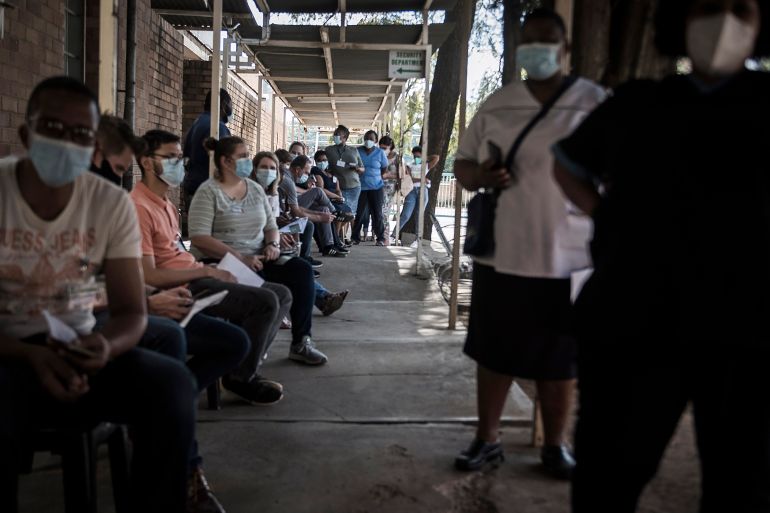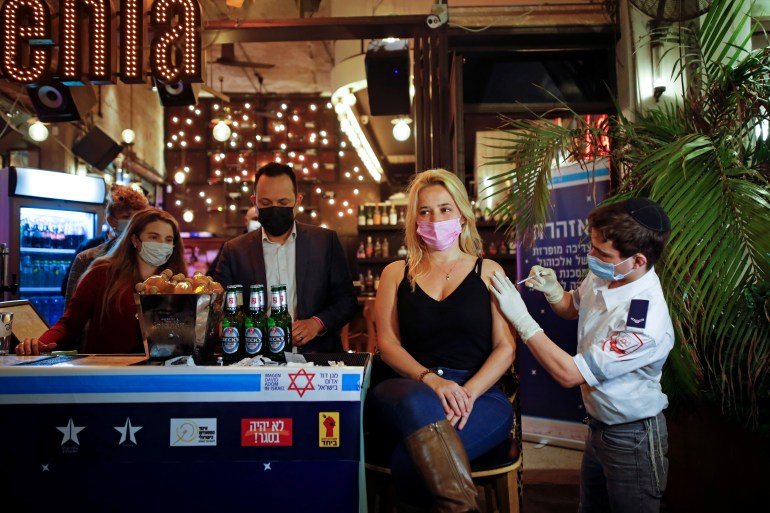Vaccine nationalism: Why hoarding COVID jabs may prolong pandemic
United Nations chief has criticised global distribution, noting that 10 countries have administered 75 percent of all vaccine doses.

As the coronavirus continues to spread around the world, with new, more infectious variants complicating responses to outbreaks, governments are racing to roll out vaccinations.
With more than 57 million vaccine doses administered, the United States is leading the way in the total number of shots administered, followed by China and the European Union.
Keep reading
list of 4 items‘We have received bodies with the mask on. Where is the dignity?’
In the UK, lower vaccine uptake among minorities causes concern
Despite COVID jab roll-out in South Africa, frustrations remain
The United Arab Emirates and Israel have administered at least one dose to the highest proportion of their populations, 81 and 54 percent respectively.
In comparison, lower- and middle-income economies have struggled. Addressing the United Nations Security Council on Wednesday, UN SecretaryGeneral Antonio Guterres said a total of 130 countries had not administered a single dose.
The stark disparity in vaccination rates between high- and low-income economies has led the UN to call for greater vaccine equity on a global scale and renew warnings against so-called “vaccine nationalism” and “vaccine hoarding”.
In his address to the UN Security Council, Guterres slammed the global distribution of vaccines as “wildly uneven and unfair”, noting that 10 countries have administered 75 percent of all vaccine doses.
“At this critical moment, vaccine equity is the biggest moral test before the global community,” he said.
On Friday, UK Prime Minister Boris Johnson pledged to give “the majority of any future surplus vaccines” to the UN-backed COVAX vaccine sharing initiative, designed to provide doses to lower-income countries.
Below, Al Jazeera takes a look at vaccine hoarding and its effect on the global fight against COVID-19.

What is vaccine hoarding?
Shortly after the first cases of COVID-19 were reported in the Chinese city of Wuhan in late 2019, scientists began work to develop vaccines to protect against the coronavirus. Global health experts warned that any vaccines should be made available equally to all countries.
Within months, high-income countries had struck deals with drug companies working on vaccine candidates, securing hundreds of millions of future doses.
“Rich countries have signed pre-purchase agreements with vaccine manufacturers,” Georgetown Law global health professor Lawrence Gostin said. “So [they] have bought up most of the world’s vaccine supplies.”
According to ONE, a group that campaigns against poverty, people from lower-income countries may not be able to be vaccinated this year because the world’s richest countries have bought one billion more doses than their citizens need.
Some countries have secured enough supplies to vaccinate their populations more than once. The countries with the most coverage per capita are: Canada with 500 percent of its population covered, the United Kingdom with 327 percent, Chile with 244 percent, New Zealand with 242 percent and Australia with 226 percent.
The rush to secure a wide range of vaccines early was partially driven by a lack of knowledge as to which vaccines would prove effective against the virus.
Gostin noted that governments also face political pressure to protect their populations first.
“Governments are under enormous pressure to prioritise their own populations. So, prioritising one’s own population is understandable,” he said.
“But all human beings have equal worth, and the selfish hoarding of vaccines is, in my opinion, unethical,” Gostin said.
Northeastern University School of Law Professor Brook Baker said that inoculating the population of a single country would not protect them if it meant that the virus continues to spread elsewhere unchecked.
“You’re not protecting your citizens; you’re giving your citizens an illusion that you’re protecting them,” Baker said.
“You need a big push to get lots of people vaccinated as quickly as possible to greatly reduce the number of newly infected people, and that’s the way to dampen down the pandemic and get it under control.”
Meanwhile, middle-income countries can still negotiate deals to procure vaccines, but some drug companies have already struggled to meet existing commitments.
“We do see middle-income countries trying to enter into vaccine deals,” Baker said.
“But if we take Moderna as an example, it already has promised 93 percent of the supply for 2021 that it can produce to rich countries. If you’re not a rich country, you can try to negotiate with Moderna, but you’re going to be [waiting] for the next 12 months until it can deliver anything to you.”
Dr Roselyn Lemus-Martin, who holds a PhD in molecular and cell biology from the University of Oxford, said if the competition to secure vaccines were to continue, the pandemic could be prolonged.
“In the current race, there are already calculations saying that for us to go back to the normal we knew before the pandemic … It’ll take seven years if we keep going like this.”
Has this been a problem before?
Vaccine hoarding is not new. In April 2009, a novel H1N1 influenza A virus strain identified in Mexico and in the US quickly spread globally.
It was the first pandemic to be labelled as such in the 21st century. Rich countries secured virtually all the supplies of the vaccine.
The World Health Organization (WHO) appealed for donations, and nine countries agreed to share 10 percent of their vaccines, but only after realising that their supplies were adequate to satisfy their own needs.
“I don’t think that is a good history. It is bad history,” WHO Director-General Tedros Adhanom Ghebreyesus has said when referring to the 2009 pandemic.
In a study published by the Lancet, the estimated range of deaths from the 2009 H1N1 virus was between 151,700 and 575,400, with many of those deaths occurring in Southeast Asia and Africa, where access to treatment resources was likely more limited.
Some experts believe that few lessons were learned regarding vaccine hoarding.
“What happened with those earlier cases is that there was a fear that there was going to be a true global pandemic. And then there wasn’t,” Baker said.
“So when the pandemic was almost over, [the rich countries] did finally donate small portions. So what lessons were learned? Not much.”
“There was a little increase in research, basic science research on coronavirus and on cases of flu.”
“There was the establishment of some global awareness of pandemics and some efforts for pandemic preparations, largely underfunded, largely under-capacitated. And we’ve paid the price,” he said.
COVAX: A worldwide alternative
The WHO, the Coalition for Epidemic Preparedness Innovations (CEPI) and Gavi, the Vaccine Alliance lead an effort known as the COVID-19 Vaccines Global Access Facility (COVAX).
COVAX is a vaccine-sharing initiative created to provide and distribute COVID-19 vaccines fairly across the world by teaming up 92 low- and middle-income countries with 98 richer ones to gain access to the vaccines market.
According to the model, rich countries will self-finance while the poor and middle-income economies will be able to access vaccines with at least part of the cost covered.
“The goal of COVAX is to end the acute phase of the pandemic globally by delivering two billion doses of safe and effective vaccines to 190 COVAX participating economies, on a global, fair and equitable basis by the end of 2021,” a GAVI spokesperson told Al Jazeera.
The initiative also aims to enable countries to have access to the world’s largest and most diverse vaccine portfolio. COVAX has so far confirmed purchases of 1.12 billion doses. However, the initiative has faced challenges ranging from funding and supply risks to contractual arrangements that could hinder its ability to achieve its goals.
Gavi said it has started to work with partners to make sure that distribution of vaccines happens as quickly as possible.
“Catalytic support is being provided to ensure country readiness for COVAX participants,” a Gavi spokesperson told Al Jazeera.
“We also need to take other aspects of country readiness into account across the health system, as well as national regulatory approval, which in many countries takes a lead from WHO.”
The first doses are expected to be rolled out from the end of February.